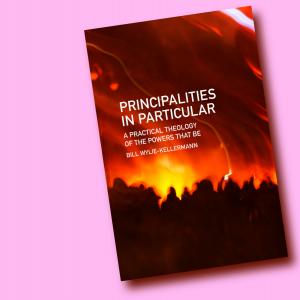
Sharon Delgado is an ordained United Methodist minister, speaker, writer, and Executive Director of Earth Justice Ministries. She is author of Shaking the Gates of Hell: Faith-Led Resistance to Corporate Globalization (Fortress Press). Her blog is at http://sharondelgadoblog.blogspot.com.
Posts By This Author
The Spirituality of Resistance
Principalities in Particular: A Practical Theology of the Powers That Be, by Bill Wylie-Kellermann. Fortress Press.
FOR DECADES, pastor, activist, and scholar Bill Wylie-Kellermann has kept alive and furthered a theology of the biblical “powers and principalities” (Romans 8:38; Colossians 1:16; Ephesians 6:12), in the tradition of William Stringfellow and Walter Wink. Principalities in Particular is a compilation of his essays, rooted in applied struggle and practice, on these invisible but embodied forces that shape and often dominate human life.
Through stories of engaging specific principalities over time, Wylie-Kellermann brings an abstract concept to life. He explores racism, nuclear weapons, sports, family systems, corporate globalization, slavery, the drug powers, war, the Trump presidency, the global economy, and other principalities, immersing readers in a worldview that perceives not only their outer manifestations, but their inner realities as well.
One example is the corporate-friendly system of emergency management that has replaced democracy in controlling the author’s home city of Detroit and other black-majority cities in Michigan.
Wylie-Kellermann portrays local community struggles as fighting (nonviolently) for the soul of the city. He describes a statue called “The Spirit of Detroit,” which stands near City Hall, providing a focus and gathering place for community activists. In a similar vein, he tells of an interfaith group that drafted letters to “The Angel of Detroit,” calling the city back to its better nature and true vocation in service of life.
Wylie-Kellermann claims that “half of any struggle is a spiritual battle.” What is at stake is not simply a specific desired outcome, but also human healing and liberation. “We are complicit in our own captivity. ... The healing of the planet and the healing of ourselves, inside and out, are one.”
Calls for Climate Justice in Paris
I was part of the United Methodist delegation to Rio de Janeiro in 1992 during the world’s first major gathering of world leaders, nongovernmental organizations, and corporate heads to focus on climate change and related environmental and development issues. It was clear even then that environmental concerns could not be effectively addressed without simultaneously addressing poverty and inequity.
As of Nov. 30, government officials, corporate leaders, and nongovernmental organizations are meeting for the 21st session of the Conference of the Parties (COP 21) for climate negotiations, this time in Paris. World leaders and other official summit attendees will be protected by greatly enhanced security because of recent terrorist attacks. Civil society won’t enjoy such protections, as indicated by the prohibition of planned demonstrations in Paris.
Some are still demonstrating in Paris, including people committed to nonviolence who formed a 10,000 person human chain and left 20,000 empty shoes — including a pair of the Pope’s shoes — to represent the protestors who are not allowed to demonstrate. Still, around the world, people are gathering to pray for the success of the climate talks and for peace.
Celebrating in Ways that Bring Joy
There are many ways to celebrate the coming of the light in this dark season of the year, including the Winter Solstice, Hanukah, Kwanza, and Christmas. Christmas is supposedly a Christian holiday, but the orgy of consumption that accompanies this holiday in the United States makes that questionable. How ironic it is that people celebrate the birth of a poor baby born in a stable (as the story goes) by spending billions on "stuff" that will ultimately end up in overflowing landfills. However, Christian or not, many are swept along by the dominant media message: "Buy gifts for your loved ones to show them how much they are loved and how precious they are."
The pressure can be hard to resist.
This may not present a problem for those who practice a Christianity that is conformed to consumer culture, but for those who seek to follow Jesus it challenges us with one of his core teachings: "You cannot serve both God and mammon." Mammon: wealth, riches, money, stuff.


